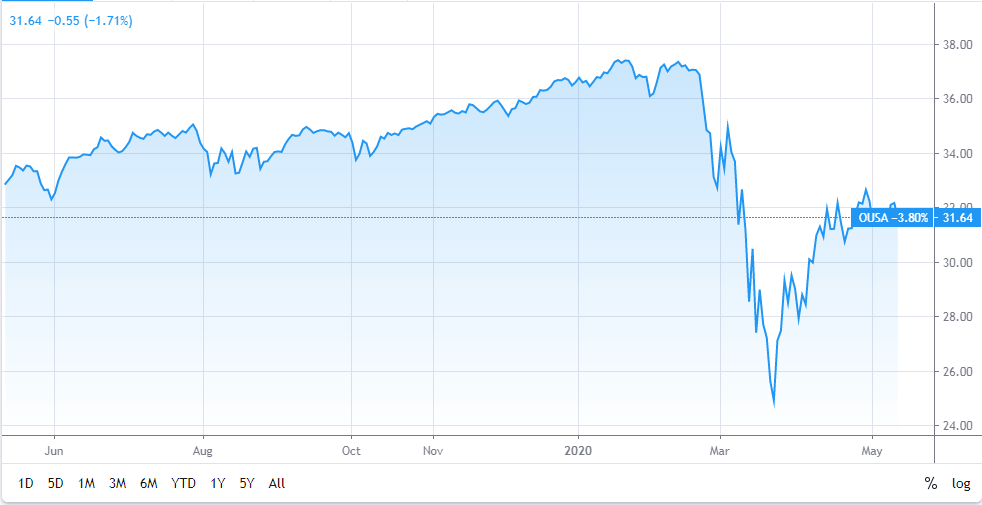The current health and economic emergency leading to wild asset price fluctuations makes the case for active management, according to Kevin O’Leary (pictured), the O’Shares ETFs chairman.
As institutional investors increasingly embrace ETFs, using diversified baskets of securities to express opinions on sectors, active management may be one of the few reliable ways to find quality in an uncertain market environment, said O’Leary, who is also an investor on TV’s Shark Tank.
ETF’s are often passively managed, where a fund’s portfolio mirrors a market index.
The global pandemic has created and contributed greatly to volatility that has seen investors considering nontransparent ETFs and active managers.
“It’s actually doing its work very well because in the case of OUSA,” the O’Shares FTSE US Quality Dividend ETF, “that’s 130-plus of the S&P, but the highest-quality balance sheets, which generally speaking are higher and more unlikely to cut dividends,” O’Leary said.
The fund’s top holdings include Apple, Johnson & Johnson, Exxon Mobil and Procter & Gamble.
“This is a time to use actively managed ETFs that focus on things like quality if you’re worried about companies that are going to fail or at least reduce dividend yields, and there’s going to be plenty of them,” O’Leary said.
In an early March 2020 report, called High Velocity Markets, BlackRock highlighted that the equity ETF trading volume in the week of 24 February accounted for 38% of the US total, compared with a 2019 average of 27%. This, the company said, suggests the instruments gave investors a tool to quickly and efficiently respond to market changes.
Bond exchange-traded funds also roared higher, following news that the Fed would buy ETFs along with other instruments in a bid to maintain market values in the aftermath of the coronavirus-induced March market shock.
The iShares iBoxx $ Investment Grade Corporate Bond ETF, the largest and most frequently traded investment-grade bond fund, rose a little more than 1% on Tuesday, its biggest move since 9 April, when the Fed announced it was expanding its bond-buying program to include below-investment grade debt. Another large bond fund, Vanguard’s Intermediate Term Corporate Bond fund VCIT, +0.47%, rose 0.5%.
Trusted & Regulated Stock & CFD Brokers
What we like
- 0% Fees on Stocks
- 5000+ Stocks, ETFs and other Markets
- Accepts Paypal Deposits
Min Deposit
$200
Charge per Trade
Zero Commission on real stocks
64 traders signed up today
Visit Now67% of retail investor accounts lose money when trading CFDs with this provider. You should consider whether you can afford to take the high risk of losing your money.
Available Assets
- Total Number of Stocks & Shares5000+
- US Stocks
- German Stocks
- UK Stocks
- European
- ETF Stocks
- IPO
- Funds
- Bonds
- Options
- Futures
- CFDs
- Crypto
Charge per Trade
- FTSE 100 Zero Commission
- NASDAQ Zero Commission
- DAX Zero Commission
- Facebook Zero Commission
- Alphabet Zero Commission
- Tesla Zero Commission
- Apple Zero Commission
- Microsoft Zero Commission
Deposit Method
- Wire Transfer
- Credit Cards
- Bank Account
- Paypall
- Skrill
- Neteller
What we like
- Sign up today and get $5 free
- Fractals Available
- Paypal Available
Min Deposit
$0
Charge per Trade
$1 to $9 PCM
Visit Now
Investing in financial markets carries risk, you have the potential to lose your total investment.
Available Assets
- Total Number of Shares999
- US Stocks
- German Stocks
- UK Stocks
- European Stocks
- EFTs
- IPOs
- Funds
- Bonds
- Options
- Futures
- CFDs
- Crypto
Charge per Trade
- FTSE 100 $1 - $9 per month
- NASDAQ $1 - $9 per month
- DAX $1 - $9 per month
- Facebook $1 - $9 per month
- Alphabet $1 - $9 per month
- Telsa $1 - $9 per month
- Apple $1 - $9 per month
- Microsoft $1 - $9 per month
Deposit Method
- Wire Transfer
- Credit Cards
- Bank Account





